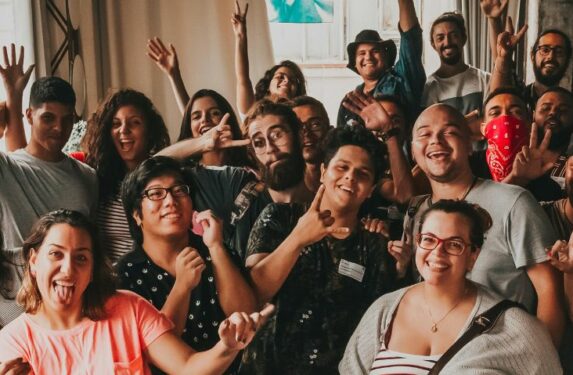
Remember the watercooler? Back in days of yore before Twitter and WhatsApp, people used to loiter around it talking about their boozy weekend or last night’s OMG moment on Celebrity Big Brother. Later, when watercoolers were quietly phased out for being parasite breeding grounds and we all got fancy Chilly’s bottles instead, informal chat happened in the kitchen, while one employee wrangled with the Nespresso machine and another burned porridge in the microwave. Or sometimes those watercooler moments happened in the lift or the office canteen or the smoking area, everyone puffing furiously and talking about nothing in particular.
Except those conversations about nothing in particular really mattered. They were informal chats with our colleagues and managers, testing the water for bigger, more formal chats we might get the chance to have later. They were opportunities to float ideas and see which way the wind is blowing, or to forage for company gossip like hungry bears, or discover things about our colleagues that added new layers to our respect or irrational loathing. Those informal watercooler moments were the lower-ranks version of deals done on the golf course – a chance to forge connections, make friends, solve problems and get the low-down on what was going on behind all those firmly closed doors.
So what happens now? The watercoolers have gone, the kitchens are Covid pits and nobody smokes anymore. Remote or hybrid working has reduced those serendipitous opportunities for bonding over sport, music, TV or a mutual hatred of that person who sneezes really loudly and doesn’t wash up their own mug.
And here’s why that’s a problem – whether we like it or not, business relationships are not built on Microsoft Teams or Zoom, and (spoiler alert) big ideas rarely happen in a brainstorm. They happen as the result of fortuitous chit-chat over a coffee in the canteen, or vaping in the car park, or in the pub after work. Informal environments loosen our ties and open us up to different perspectives, taking away the rigid frameworks of meetings and workshops and allowing proper freeform thinking and innovation.
The move to remote or hybrid working will impact us all (read more thoughts here on office-based working vs remote working bias), but it’s junior employees who will take the biggest hit. They already have a limited voice in formal work situations, and in future could have even fewer opportunities to make friends, ask questions, pitch their ideas and share their perspectives without the pressure of a ‘proper’ conversation. Employers owe it to their businesses and their best and brightest employees to find informal ways to maintain casual connections, making the most of whatever office time there is and opening up digital opportunities too. It’s undoubtedly a challenge, but companies that nail it will reap the benefits for years to come.
So RIP the watercooler – you will be missed, even though your water tasted like plastic and your overflow tray smelled a bit fusty. But long live the joy of informal workplace chit-chat – we didn’t realise it at the time, but you really mattered. So, if you’d like an informal chat about anything (or nothing in particular), get in touch*.
*Watercooler not included.
 Why start with EVP? 23 Apr Do you say “employer value proposition” or “employee value proposition?” At BrandPointZero we’ve (mostly) decided on the former. We think about EVP as a compelling […]
Why start with EVP? 23 Apr Do you say “employer value proposition” or “employee value proposition?” At BrandPointZero we’ve (mostly) decided on the former. We think about EVP as a compelling […] How to make your EVP work harder 6 Mar For many organisations, their EVPs & Employer Brands are associated with recruitment and resourcing. But during these uncertain economic times, we think the role of […]
How to make your EVP work harder 6 Mar For many organisations, their EVPs & Employer Brands are associated with recruitment and resourcing. But during these uncertain economic times, we think the role of […] Bristol agency BrandPointZero to merge with That Little Agency to create larger full-service employer brand marketing agency 4 Jan Bristol-based employer brand agency BrandPointZero has announced a merger with fellow Bristol agency That Little Agency, a move that will significantly increase the PointZero Group’s […]
Bristol agency BrandPointZero to merge with That Little Agency to create larger full-service employer brand marketing agency 4 Jan Bristol-based employer brand agency BrandPointZero has announced a merger with fellow Bristol agency That Little Agency, a move that will significantly increase the PointZero Group’s […]
